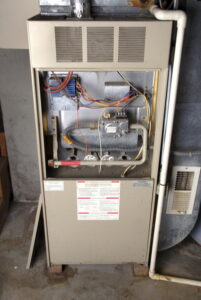In Pennsylvania, it’s critical for your heating system to work as well as possible throughout the winter. That’s why it’s so important to prioritize heating maintenance. This service is not just for the sake of catching any existing problems before they become severe enough to cause your heater to fail on a frozen January night. Maintenance also improves your heater’s efficiency (keeping your utility costs down), prevents safety hazards (like fuel or carbon monoxide leaks), and increases your heater’s lifetime of service (so you can delay replacing it for years to come).
So what is actually involved in the process, and how does it accomplish all this great stuff? We’ll provide a general guide to what steps your technician will take while performing heating maintenance. Gas and electric heaters require some different steps, but many parts of the process are the same.
Cleaning
The access panel of your heater will be removed and the interior cleaned. Some of the most important parts to clean are the flame sensor, pilot assembly, and blower motor. Dust accumulation can prevent these components from functioning properly. A dirty flame sensor may fail to detect a flame, keeping your heat from turning on because it doesn’t register that the pilot light is on. A dirty pilot assembly can mean that the pilot light will actually not go on.
Inspection
The technician will inspect all the components of your heater, including the heat exchanger, flue, ductwork, ignition system, burner tubes, safety controls, and more, confirming that they are in good shape and working properly.
Testing of Electrical Components
All the electrical parts of your heater, including the thermostat and the blower motor capacitors, will go through testing that ensures that they are properly calibrated and operating safely. All electrical connections will be inspected to make sure they are secure and safe.
Lubrication
Motion causes friction, and heating systems have moving parts. Excessive friction can lead to wear and tear, overheating, and even motor wiring fusing together and burning out the motor. During maintenance, moving parts like the blower motor and fans are properly lubricated to ensure smooth operation.
Safety
Natural gas heaters require specific steps to ensure that they are operating safely. Your technician will check for any signs of gas leakage, test the heater’s CO detector for proper functioning, and also run a test that determines whether complete combustion is being achieved. Incomplete combustion creates hazardous gasses including carbon monoxide, so it is absolutely critical to test for this.
Changing the Air Filter
This piece of heater maintenance is something that you should do yourself every three months, or more frequently during heavy use or when there’s an unusual amount of dust in the air. Your technician will also clean the filter while maintaining the heater.
Clear Communication
You should have as clear an understanding as possible about your heater’s well-being, how to decrease the likelihood of problems, and how to increase your heating efficiency. When you have maintenance done on your furnace in West Chester, PA, you should expect clear communication from your technician on these topics. You should also feel comfortable asking them any questions you have about your home’s heating system.
Contact Platinum Plumbing & Heating, Inc. today to schedule an appointment with our pros.

